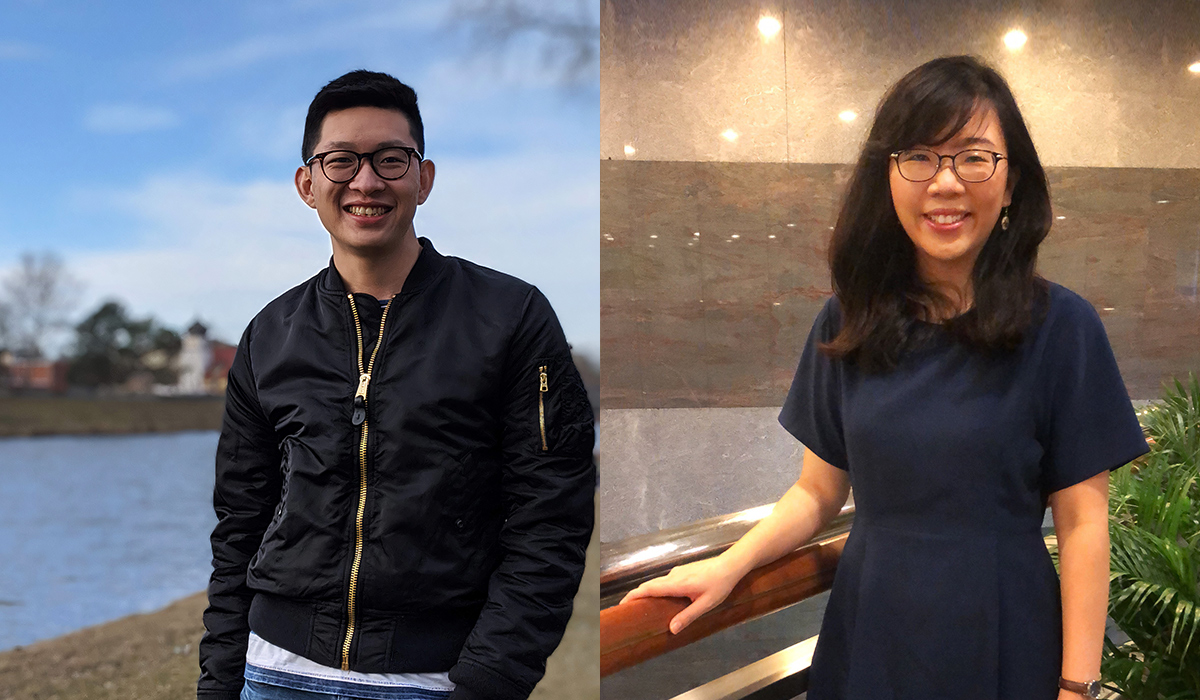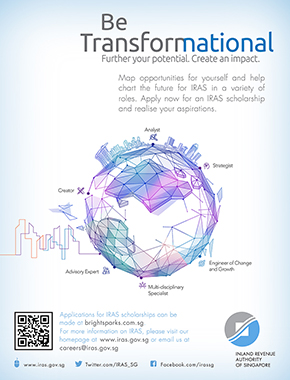Left: IRAS Undergraduate Scholar, Teo Qi Xuan is studying a Bachelor of Science in Statistics & Machine Learning at Carnegie Mellon University.
Right: Serene Lau is an IRAS Undergraduate Scholar with a Bachelor of Laws from Singapore Management University. She is a Senior Associate in the Litigation Branch of IRAS, where she provides legal advice and represents IRAS in litigation.
When the Inland Revenue Authority of Singapore (IRAS) is mentioned, two words come to mind – “tax collector”. Unfortunately, most of us have only a cursory understanding of the deep and diverse work that goes on in this organisation.
After all, IRAS collects taxes that account for more than 70% of the government's operating revenue, making them the biggest player in tax policy, treaties and valuations.
Because of that, much accountability is required of those who choose a career with IRAS, which itself present ever-evolving challenges for tackling. However, IRAS Scholars Serene Lau and Teo Qi Xuan are excited at the opportunity to fine-tune the tax process and experience.
While Serene is already in the thick of things as a Senior Associate in the Litigation Branch of IRAS, where she provides legal advice and represents IRAS in litigation, Qi Xuan is still pursuing a Bachelor of Science in Statistics & Machine Learning at Carnegie Mellon University.
Their differing starting points make for a single picture of IRAS as a dynamic organisation constantly on the path of innovation.
Firstly, why IRAS? What were your reasons for taking up a scholarship with this particular organisation?
Serene: One thing about IRAS which particularly stood out for me was its commitment to investing in its people. During the scholarship briefing sessions, I learned that upon joining IRAS, one would not necessarily be limited in his or her opportunities based on specialisation. When I learnt about the open postings, rotations, and breadth of in-house training programmes available, I felt that IRAS was a place where I could develop into a multi-faceted individual.
Qi Xuan: What I really valued in IRAS was their reciprocal interest in me. IRAS not only had a strong interest in my course of study, which is relatively niche, they also went out of their way to give me opportunities and welcome me to the family even before I had obtained the scholarship. I felt comfortable taking up the IRAS Overseas Scholarship knowing that I was joining an organisation that shows concern for their employees beyond the workplace.
Serene, you've already begun work at IRAS. What is your job scope?
Serene: I am currently in the Law Division, Litigation Branch. For context, when a taxpayer disagrees with IRAS' tax treatment, he may bring an appeal against IRAS' decision. The taxpayer's case will then be litigated or “fought” (in common parlance) before the tribunal or court. I am part of the team that is responsible for the conduct of these civil litigation cases, and I sometimes represent IRAS on matters of taxation in the court.
Is there any moment that made you feel particularly glad to have chosen this organisation?
Serene: I am very privileged to have been exposed to a broad range of tax-legal work in the Law Division.
Prior to joining Litigation, I was part of the Advisory and Legislation Branch in 2018. During my stint there, I was very lucky to be involved in the drafting of major legislative amendments to the GST Act that year, in particular, the introduction of the “Netflix Tax”. As this was going to be a new tax on the digital economy, its parameters and scope required the team to apply established GST principles to modern digital transactions. This was equal parts exciting and challenging. The experience was also particularly memorable for me as I had the opportunity to work closely with colleagues from a different division (GST Division) as well as the legislation team from the Attorney-General's Chambers.
And Qi Xuan is still studying. At first glance, Machine Learning is not very connected to IRAS' work. How do you anticipate applying your knowledge at IRAS?
Qi Xuan: I have zero regrets about pursuing my course! While numbers seem intrinsically linked to taxation, I think the relevancies go beyond that. Both statistics and machine learning provide such unique advantages in data work, from interpreting data, prediction, and verifying hypotheses – these are all eye-opening discoveries!
In my work with some real-life datasets, I've often encountered relationships or data that go beyond our intuitions or suspicions, and we would never have realised our previous biases had we not performed these tests. I am also interested in the area of behavioral science which challenges me to think about how policies or initiatives are implemented and how every little aspect of the implementation could have a significant impact on how others receive it. IRAS has been supportive in the pursuit of my areas of interest and I hope to lend my expertise to the organisation in the years to come.
We also learnt you interned with IRAS previously. For both of you, what is the IRAS work culture like?
Qi Xuan: My internship experience has been amazing so far due to my coworkers! I really enjoyed the supportive culture in IRAS and I received valuable mentorship and guidance from pretty much every coworker I interacted with. While all the work in IRAS is taxation-related, there are still many different aspects and fields of study within this broad category and I enjoyed being able to utilise different skills during my internship. In fact, I believe I stayed past my original end-date both times I interned in IRAS.
Serene: In IRAS, there is a culture of always striving to improve the status quo. Apart from day-to-day responsibilities, one can expect to be involved in a range of projects which seek to improve the current way of doing things.
These synergistic working relationships, as well as mutual trust and respect are not things that are built overnight. They are something I deeply cherish and appreciate about working in this organisation.
Seems you each have had lots of experience with IRAS. What does it have to offer scholars like yourself?
Serene: The in-depth and broad range of exposure to tax work in IRAS probably does not require much elaboration. Apart from tax work, there are also ample opportunities in other fields such as Infocomm Technology, Data Analytics and Strategic Planning. These roles are especially integral now as IRAS turns its focus to digitalising, innovating new enterprise solutions, and reinventing the way we work.
Extremely Sporting
Serene is always up for a challenge in more ways than one – she skydived during her exchange in Switzerland!
Speaking from personal experience, IRAS has given me a lot of exposure these three years. During my first year, I did a dual posting in both the Law Division and the Investigation & Forensics Division (IFD). My stint in IFD exposed me to both policy and operational work, which broadened my perspectives on the tax landscape and operational challenges we face. Even within Law Division itself, rotations exposed me to advisory, legislation, litigation, as well as prosecution work.
Qi Xuan: The main reason why I selected IRAS was because of their emphasis on data, which was apparent even in the scholarship application itself. However, beyond dedicated teams working on data analysis and security, individual groups all across IRAS are forming teams focusing on data analysis. There are also opportunities for movement and transfers across different functions within IRAS.
I feel that aspiring scholars should join IRAS if they want to be part of an organisation that genuinely cares for one another! The culture was definitely very different from what I had envisioned and turned out to be a huge draw for me.


